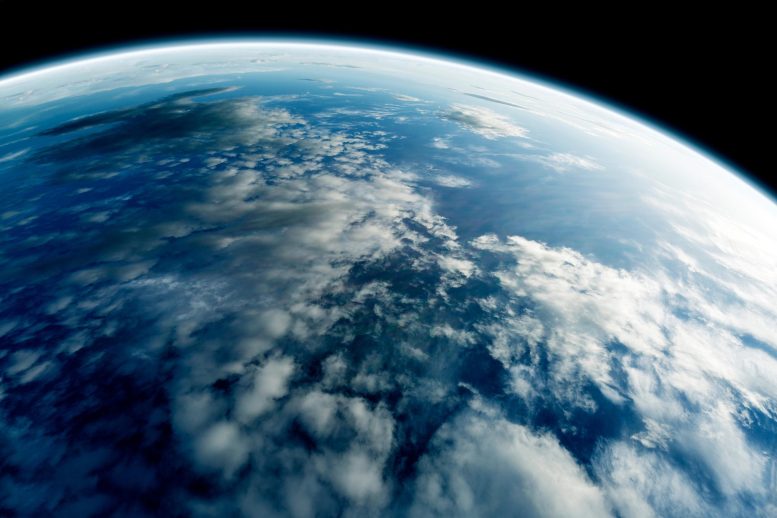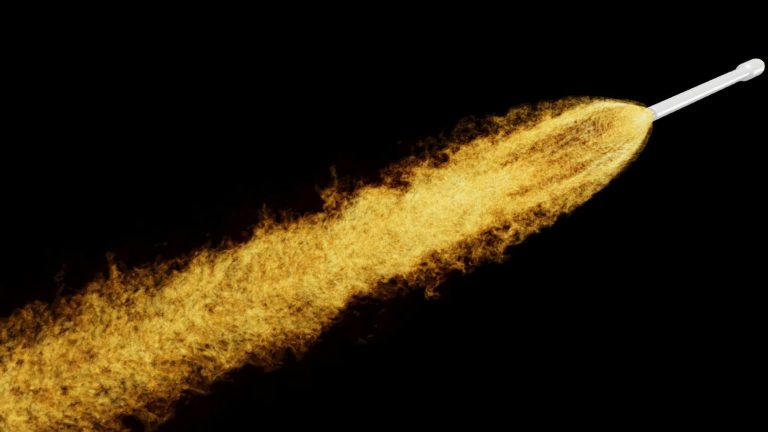
Scientists have discovered that rocket engine exhaust pollution can significantly increase the concentration of pollutants in the mesosphere for an extended period of time.
By simulating the fluid dynamics of rocket exhaust gases, scientists have been able to analyze the atmospheric emissions from rockets
Commercial spaceflights by firms like SpaceX and Virgin Galactic have popularized the use of reusable space technologies to achieve space transportation at a reduced cost. However, the fact that the propulsion emissions from rockets cause considerable heating and chemical changes in the atmosphere is hardly known.
Researchers from the University of Nicosia in Cyprus evaluated the potential effects of a rocket launch on atmospheric pollution by looking into the heat and mass transfer and rapid mixing of the combustion byproducts for altitudes up to 67 kilometers into the atmosphere. Their findings were published in Physics of Fluids by AIP Publishing on May 17th, 2022.
“Improved understanding of rocket emissions requires modeling and simulation of fluid dynamics of rocket exhaust gases into the atmosphere,” said co-author Dimitris Drikakis.

Rocket exhaust plume at 30 km as obtained by high-resolution computational fluid dynamics simulations. Temperature varies from 680 K (dark yellow) to 2,400 K (bright yellow). Credit: Ioannis Kokkinankis, Dimitris Drikakis, University of Nicosia, Cyprus
The team modeled the exhaust gases and developed plumes at several altitudes along a typical trajectory of a standard present-day rocket. They did this as a prototypical example of a two-stage rocket to transport people and payloads into Earth’s orbit and beyond.
“We show that pollution from rockets should not be underestimated as frequent future rocket launches could have a significant cumulative effect on the Earth’s climate,” said co-author Ioannis Kokkinakis.
The researchers found the production of thermal nitrogen oxides (NOx), components of the combustion exhaust, can remain high up to altitudes with an ambient atmospheric pressure above or even slightly below the nozzles’ exit pressure, i.e., below an altitude of approximately 10 km (6 mi).
At the same time, the emitted mass of carbon dioxide as the rocket climbs 1 kilometer in altitude in the mesosphere (the region of the atmosphere between the thermosphere and stratosphere, located at an altitude of 30-50 miles or 50-80 kilometers) is equivalent to that contained in 26 cubic kilometers (6.2 cubic miles) of atmospheric air at the same altitude.
They found the impact on the atmosphere locally and momentarily in the mesosphere can be significant. While air currents will gradually transport and mix the exhaust CO2 throughout the atmosphere, eventually bringing the CO2 back down to its naturally occurring levels, the time scale over which this happens is not clear.
The scientists believe a certain number of rocket launches might still exist above which mesospheric carbon dioxide could accumulate over time, thus increasing the naturally occurring levels and affecting our climate.
Their results suggest that in the worst-case scenario, sufficient NOx could be produced over the time it takes the rocket to reach an altitude of 10 kilometers (6 miles) to pollute over 2 cubic kilometers (0.5 cubic miles) of atmospheric air with a NOx concentration that, according to the World Health Organization, would be at a level hazardous to human health.
“We hope that commercial flight companies, such as SpaceX, Virgin Galactic, and the New Shepard, and their associated engine manufacturers, will consider these effects in future designs,” said Drikakis.
Reference: “Atmospheric pollution from rockets” by Ioannis W. Kokkinakisa and Dimitris Drikakis, 17 May 2022, Physics of Fluids.
DOI: 10.1063/5.0090017









Be the first to comment on "Scientists Discover That Rocket Exhaust Pollution Lingers in the Earth’s Atmosphere for a Disturbing Amount of Time"